
Swansea is a coastal city and the second-largest city of Wales. It forms a principal area, officially known as the City and County of Swansea.
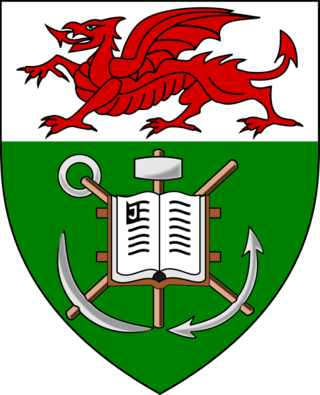
Swansea University is a public research university located in Swansea, Wales, United Kingdom. It was chartered as University College of Swansea in 1920, as the fourth college of the University of Wales. In 1996, it changed its name to the University of Wales Swansea following structural changes within the University of Wales. The title of Swansea University was formally adopted on 1 September 2007 when the University of Wales became a non-membership confederal institution and the former members became universities in their own right.

Singleton Hospital is a general hospital in Sketty Lane, Swansea, Wales. It is managed by Swansea Bay University Health Board.
Townhill is the name of a hill, a residential district and a community and electoral ward in Swansea, Wales, UK. It had a population of 8,696 in 2011.

Singleton Park is the largest urban park in the city of Swansea. It is located in Sketty and is listed on the Cadw/ICOMOS Register of Parks and Gardens of Special Historic Interest in Wales.
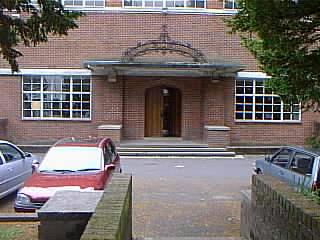
The Bishop Gore School is a secondary school in Swansea in Wales, founded on 14 September 1682 by Hugh Gore (1613–1691), Bishop of Waterford and Lismore. It is situated in Sketty, close to Singleton Park and Swansea University. In December 2013 the school was ranked in the second highest of five bands by the Welsh Government, based on performance in exams, value added performance, disadvantaged pupils' performance, and attendance.
Taliesin Arts Centre is owned and managed by Swansea University and is located on the university's Singleton campus in Swansea, Wales, United Kingdom.

Morriston Hospital is a 750-bed hospital located in Cwmrhydyceirw near Morriston in Swansea, Wales. It is managed by Swansea Bay University Health Board. Alongside its role as a district general hospital, Morriston is a teaching hospital for medical students of Swansea University Medical School.

First Cymru is an operator of bus services in South West Wales. It is a subsidiary of FirstGroup with its headquarters in Swansea.

Singleton Abbey is a large, mainly 19th-century mansion in Swansea, Wales. Today, the buildings are used to house administration offices for Swansea University. They can be found at the eastern end of the Swansea University Singleton Park campus.

Sketty Hall is a venue used for hosting social functions, business functions and conferences in Singleton Park, Swansea, south Wales. The original building was built in the early 18th century as a private house. Over the years it has seen a number of extensions, modifications and changes of use to its present-day role.
"Smith and Jones" is the first episode of the third series of the British science fiction television series Doctor Who. It was first broadcast on BBC One on 31 March 2007. It sees the debut of Freema Agyeman as medical student Martha Jones. Agyeman had previously appeared as Martha's cousin Adeola in the 2006 episode "Army of Ghosts". The episode also introduced Martha's family, her mother Francine, father Clive, sister Tish, and brother Leo.
The suburban district of Sketty is about 2 miles (3.2 km) west of the Swansea city centre on Gower Road. It falls within the Sketty council ward of Swansea. It is also a community.

Swansea University Medical School is a medical school on Swansea University's Singleton campus. It is linked to additional teaching centres located throughout South and West Wales, including Cefn Coed Hospital, Singleton Hospital and Morriston Hospital in Swansea, Prince Philip Hospital in Llanelli, Withybush General Hospital in Haverfordwest and Bronglais Hospital in Aberystwyth. The Medical School also has a network of primary care teaching centers.

This is a list of the National Register of Historic Places listings in Meeker County, Minnesota.
Florence Annie Mockeridge was a British botanist and university professor.

The City and County of Swansea is a principal area in south Wales. It covers an area of 380 km2 (150 sq mi) and in 2021 the population was approximately 237,800.
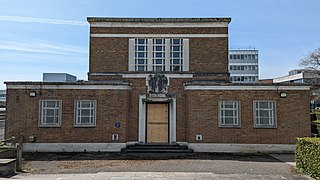
The 1937 Library is a Grade II-listed Modern Movement library at Swansea University, Wales. It was built in the 1930s.
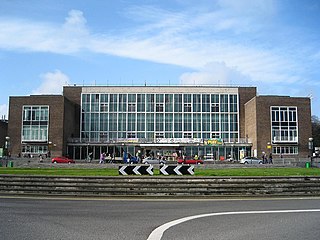
Fulton House is a Garde-II listed Swansea University building in Singleton Park, Swansea.
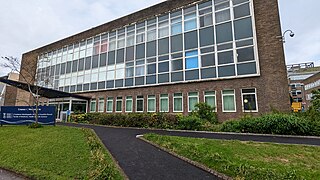
The Grove Building is a Swansea University building, in Singleton Park, Swansea, Wales.














